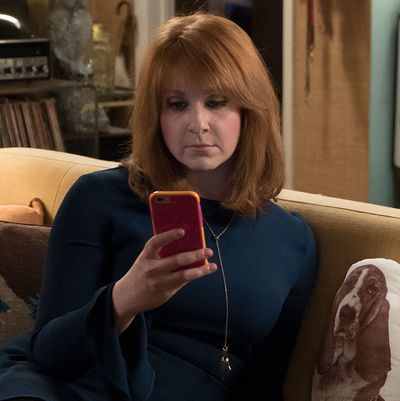
Difficult People could’ve been called People With Impulse-Control Problems, or maybe just Assholes. That’s a compliment, incredibly. A lot of post-Seinfeld sitcoms tried to borrow that classic sitcom’s id-blast humor, but aside from HBO’s currently dormant Curb Your Enthusiasm and the amazing Veep (which is overseen by Armando Iannuci, the master of invective), not too many are willing to really, truly commit and create unpleasant characters that you ultimately like because they’re funny and make an art out of going too far. I went into Difficult People — a new Hulu series executive-produced by Amy Poehler — with arms folded. Mainly because its central couple — YouTube star Billy Eichner, and stand-up comic and onetime Vulture contributor Julie Klausner, who created the show — are playing versions of themselves, and I’m not convinced TV needs another show where comedians play versions of themselves. But this one can be grandfathered in because it’s funny and crude and doesn’t seem to give a damn if you like it.
Julie and Billy (Klausner and Eichner) are straight-woman-gay-man besties, but there’s nothing warm about them. They’re Will and Grace by way of battery acid. The pilot establishes them as world-class misanthropic narcissists, starting with the opening scene, where they attend a matinee of Annie and make fun of Franklin Delano Roosevelt on the way in. “I love that he was born during a time when handicapped people still had to wear blankets on their laps,” Billy says. “Isn’t it funny how FDR is a total hero in this play even though he let millions of Jews die?” Julie replies. They take their seats and continue trading bitchy quips until a mother in the row in front of them chastises them for using bad language and they tell her to go fuck herself.
Julie and Billy could give W.C. Fields a run for his money in the misanthrope department, but deep down, they crave attention and approval. They’re comedians and storytellers and semi-celebrities and shameless social-media whores when they’re not working at the coffee shop that Julie manages. The show is very canny about showing how all these jobs and pursuits are a packaged deal now, part of the continual performance of life. It also captures how professional comedians acknowledge other people’s funniness with a bizarrely detached kind of appreciation, blankly stating, “That’s funny,” instead of laughing. Julie and Billy can’t seem to go five minutes without checking their social-media platforms for likes, retweets, shares, insults, unfollows, and exhortations to kill themselves. “Like I’m fucking pressing for medication in a hospital!” Billy says, refreshing his iPhone screen. Julie likes to shock her audiences, even when she’s recapping The Real Housewives of Beverly Hills (which Klausner actually did for Vulture), but would rather not be around when other people are debating the merits of her work or her existence. “I don’t like fighting with people,” she says. “I just like saying something slightly crazy and then leaving the room.”
Billy is getting over a breakup, or trying to, and mulling his dating options. “What’s more of a turnoff, veganism or Judaica?” he asks Julie. Julie has a live-in boyfriend, a PBS host named Arthur (James Urbaniak, the MVP of everything he’s in); they’re a great couple, and the way he dotes on her and calls her “Noodles” softens the character without seeming to soften her. But once you look past the placid surface, you see that they’re an unconventional couple that doesn’t rule out the possibility of a threesome and has no plans to marry, much less raise kids. “I was told I can’t have children … because I hate them,” she says. Julie is the only child of a therapist named Marilyn (Andrea Martin, another habitual MVP), who spends all day helping people confront their insecurities but might get plastic surgery provided she can overcome the fear that others will think she’s vain. “Mom, there’s no morality to this thing,” Julie tells her. “If you look your age, you’re lazy. If you’ve had noticeable plastic surgery, you’re shallow. Women over 20 can’t win no matter what.” “My mind started to wander when you generalized, and then I dozed off,” her mother replies.
The three episodes I’ve seen are so milieu-specific that Difficult People might prove a tough sell for anybody outside of the big city actor-comedian-YouTuber-whatever matrix; then again, though, so many people are now a part of that matrix, or standing on the edge of it peering in, that the writing’s anthropological exactness could strike a nerve. Either way, the show’s main sell is its irreverence. It does not feel focus-grouped; sometimes it doesn’t feel second-guessed. Julie and Billy and many of the other characters talk to each other the way best friends talk to each other when they think nobody is listening. Every other scene contains a line that could keep the outrage/apology cycle humming for at least a half-day. Billy tells a fellow coffee-shop employee, a younger and unctuously competitive gay man, “Sometimes when I hear you speak, I feel like I should join the Westboro Baptist Church.” Another scene begins with Julie mid-brag: “… and I said, ‘No, give that diversity scholarship to someone more diverse than me’ … and that’s how Black-ish happened.” These two could easily have ended up in that jail cell with Jerry, George, Elaine, and Kramer in the Seinfeld finale, or at the very least in an adjacent cell. There is no hugging here, no learning, maybe no hope. They are who they are. “I like new us!” Billy peals at the end of an episode. “I love new us!” Julie replies. They haven’t changed a bit.
*A version of this article appears in the August 10, 2015 issue of New York Magazine.


